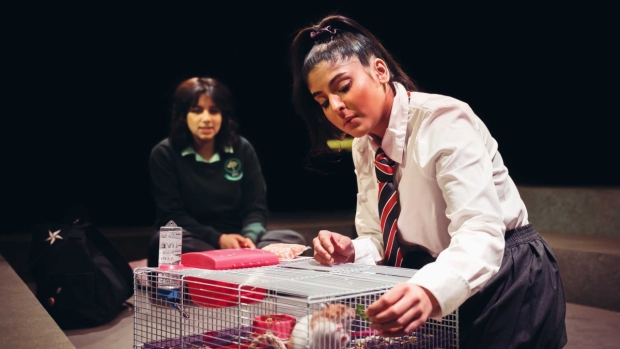Two Billion Beats at the Orange Tree Theatre – review

© Alex Brenner
If cancel culture has taught us anything, it's that the internet can be quick to judge someone as the ‘right' or ‘wrong' type of activist. Groups of people who might appear united in their beliefs can actually descend into tearing each other apart on Twitter over the nuances of an issue. But this timely and thoughtful new play from Sonali Bhattacharyya makes the suggestion that two people with very different perspectives on something can both be right at the same time. Named Two Billion Beats (supposedly the average lifespan of a heart), it reflects on how to make a difference in the world and imagines the experiences of two British-Asian teenage girls living in Leicester.
Asha (Safiyya Ingar) and younger sister Bettina (Anoushka Chadha) are struggling to find their own voices. They keep ending up in battles – whether with their teachers, bullies, or their mum. Asha handles these with punkish intellectual spirit; taking inspiration from famed revolutionaries like Indian social reformer BR Ambedkar, or suffrage campaigner Sylvia Pankhurst. (The show's slightly overwrought opening sets out her politics in some detail). Bettina is more concerned with being liked, which has its own advantages, but she's also naïve and gets picked on by other children.
Neither of them is wrong. Each girl is made to see that there are merits to the other's approach to life, but also that there is a compromise to be struck between constantly bashing the ‘system' in which they live, and trying to work within it. In fact, Two Billion Beats has various affirming insights, including on how fear can stop us standing up for what we believe in. One thread sees Asha mulling whether to continue her firebrand essay-writing at the risk of losing the offer of a university place.
Racism and sexism pose the sisters extra difficulties as they try to negotiate their places in the universe. The play compellingly shows that the stakes can be high when people – especially women – from a diaspora community raise their voices. The duo discovers that loose words can alienate allies, or even get others into trouble. Bettina's false accusation against a school bully, who is Muslim, lands the offending boy on a terror watchlist. An interesting tension is repeatedly explored, between ‘looking after' a wider community and expressing individual needs. Here, again, the thoughts of BR Ambedkar are contrasted with those of Gandhi; the debate playfully framed as a boxing match.
Director Nimmo Ismail helps to create a lovely dynamic between the sisters: one that's tender but rivalrous, and which gives this short two-hander so much of its appeal. Asha and Bettina argue about not only the big things, but the little things too. Most amusingly, they cannot agree whether Bettina's pet rodent is a hamster or a guinea pig. The play is surprisingly loose and funny when it wants to be (at times it even erupts into dance), and the naturalistic dialogue helps to cut through some of the more dense political passages.










